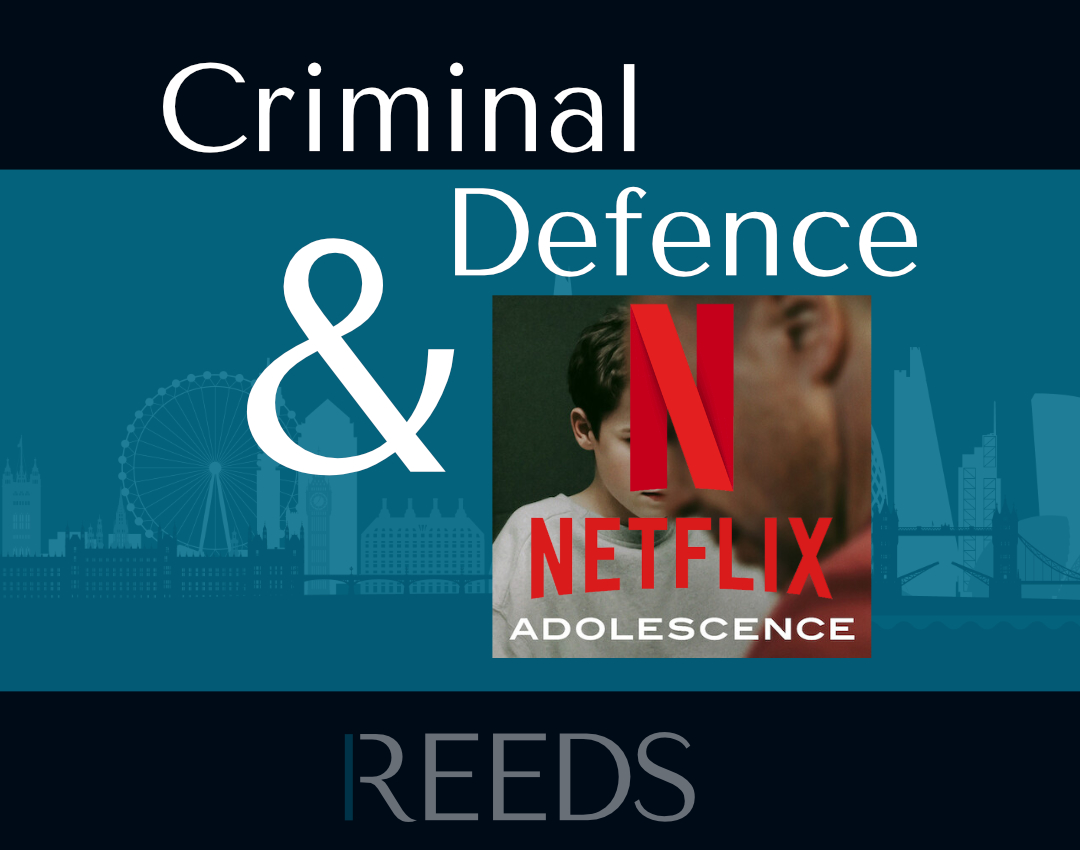The Netflix show, Adolescence, is one of those rare TV programmes that breaks out into the mainstream, capturing the zeitgeist and provoking debate about the issues raised. The show centres around a 13-year-old boy, Jamie, who is arrested and interviewed on suspicion of murder. As a criminal defence solicitor, crime shows are often difficult to watch because the events often bear little resemblance to the reality of the criminal justice system. Adolescence promises to be different – and goes to great lengths to portray the ‘behind the scenes’ aspects of a police investigation. We are shown Jamie being booked into custody, being assessed by a Healthcare Professional and having samples and swabs taken.
Jamie is allocated a duty solicitor (Mr Barlow) to represent him – and the show does a reasonable job of capturing the well-intentioned and earnest approach of a defence lawyer (“I’m here to protect you”). We are also shown the ‘pre-interview disclosure’ conversation between the solicitor and the interviewing officers – something that is rarely shown in TV dramas. But how realistic is this depiction of the defence lawyer? And was the right advice given?
The short answer is that if a lawyer had behaved like that in a real murder investigation, he would have woefully failed his client and would likely be accused of negligence. Of course, Adolescence is only a TV show, but it does do quite a good job of illustrating some of the crucial mistakes that lawyers can make at the police station.
Everything Netflix’s Adolescence Got Wrong in the Police Interview
The first key interaction is in the pre-interview disclosure meeting between Mr Barlow and the interviewing officers. It’s an opportunity to seek as much information about the allegation possible in order to assess the strength of evidence and properly advise the client. Under the Police and Criminal Evidence Act (PACE), a suspect has the right to be given ‘disclosure’ about the allegation before the interview, to enable them to understand the nature of the offence and why they are suspected of committing it. In the show, the lawyer asks no relevant questions at all. At one point, almost comically, he enquires as to whether his client has ‘been fed’, despite this being a question for the custody sergeant at an earlier stage. The meeting ends without his even establishing the location of where the crime occurred. In reality, an effective lawyer would ask many questions, noting down both the answers and the information the officer refused to disclose.
Next, is the crucial question of what advice to give to the client. Mr Barlow gets off to a bad start by failing to advise Jamie that he doesn’t have to consent to give a blood sample, although ‘adverse inferences’ can be drawn if he refuses. In the private consultation with Jamie, he also fails to check whether Jamie consents to his father to be present for the confidential conversation. Nevertheless, Mr Barlow initially lands on the correct advice for Jamie – to answer no comment to the police questions. In reality, advice would be given after taking the client’s instructions and explaining the disclosure and the definition the offence.
Before providing an account to the police, it’s sensible to wait until a fuller picture of the evidence has been provided, especially when facing such a serious allegation and with a total lack of disclosure. The position about whether to put an account forward can be reviewed during the course of the interview (the interview can be stopped at any time for a further consultation) – and during a murder investigation there is likely to be a series of interviews, often involving phased disclosure of the evidence. A ‘no comment interview’ requires careful preparation, justifying the advice to the client and explaining very clearly when the ‘no comment’ responses begin (i.e. after the preliminary questions confirming the suspect’s name etc).
Unfortunately, Mr Barlow goes on to advise what is, in effect, a ‘mixed comment interview’ – telling his client to only answer ‘no comment’ to questions about ‘last night’. Asking a 13-year-old (or any client for that matter) to discern between which questions to answer and which to say ‘no comment’ to is clearly dreadful advice. A client needs clarity in this stressful situation and even seemingly trivial questions put by the officer about the days and weeks before the offence may later hold important evidential significance. The problem with the ‘mixed comment’ approach is perfectly illustrated in the interview and it is very rarely an appropriate course of action.
From a defence point of view, the interview depicted on the show is a car-crash. Jamie initially answers ‘no comment’ to a few questions but when the topic switches to his school-life, he answers the questions. Likewise, he answers questions about ‘aggressive comments’ he has posted on Instagram, and then even more importantly – about what he was wearing the night before the murder and his relationship to the victim. These kinds of details can prove crucial in a criminal investigation and the answers given are often scrutinised in cross-examination at trial.
Things get even worse when Jamie identifies himself on a series of CCTV footage stills, which place him near the scene of the murder and following the victim, potentially closing an evidential gap. The officer says that he has the CCTV footage to play – and this is when the lawyer intervenes to suggest a break in the interview for a further consultation. This is odd timing, because a further consultation makes more sense after the CCTV evidence has been reviewed. Jamie’s father, who is acting as the appropriate adult, overrules Mr Barlow and says, ‘let’s carry on’. In reality, it’s unacceptable for a lawyer to lose control of an interview in this way.
Conclusion
The scene raises an interesting question about what to do when an appropriate adult disagrees with the lawyer. This kind of issue can be pre-empted by being clear and, where necessary, assertive with the appropriate adult about the respective roles, before the interview takes place.
In end, the evidence against Jamie was overwhelming and, by sheer luck, Mr Barlow’s poor advice didn’t turn out to be a deciding factor. However, there are many cases where the advice at the police station stage is crucial and can have a fundamental bearing on whether a matter is prosecuted or dropped. For this reason, it is essential to receive quality advice at the police station and to make a considered and careful decision about the right interview strategy.
This article was written by Nathan Seymour-Hyde.

